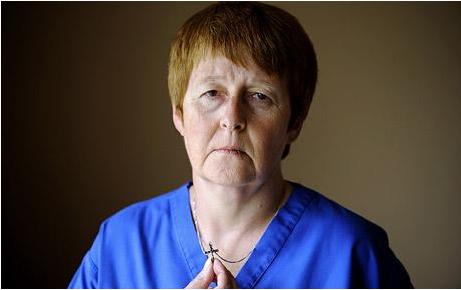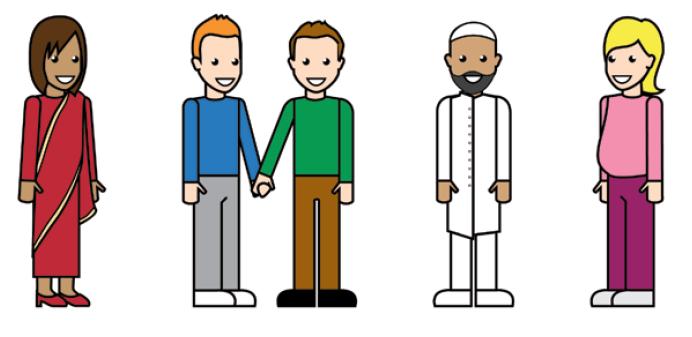Discrimination against UK Nurse Shirley Chaplin exposes inequalities in the UK's Equality Act

"A Christian nurse who refused to remove a crucifix at work has lost her claim for discrimination after an employment tribunal panel ruled that she should have reached a compromise with her hospital employers."
[The (UK) Sunday Times, 7th April 2010, 'Crucifix ban nurse Shirley Chaplin loses NHS discrimination case'].
The case was first reported back in September 2009 by the (UK) Telegraph newspaper article, Nurse faces the sack for refusing to take off her cross'
"Shirley Chaplin, a committed Christian, has been told by her employers that she must hide or remove the cross or remain out of the hospital wards. Royal Devon and Exeter Hospital (located in the south-west of England) told her that she cannot wear the one-inch tall silver cross openly around her neck, because it breaches their uniform policy and poses a risk to patients.
While the Trust has banned the crucifix in its wards, it makes concessions for other faiths, including allowing Muslim nurses to wear headscarves on duty.
She has been warned by her employers that she will be suspended if she does not comply with their request. There are fears that this would lead to her dismissal.
Mrs Chaplin, 54, says she has been shocked and distressed by the threat, which means she must choose between her faith and her job.
[Read More].
UK Equality Act Open to Subjective Interpretation
It is inconsistent that a small neck cross worn by British nurse Shirley Chaplin could be health risk to patients, while bangles worn by Sikh nurses and while headscarves and long sleeves worn by Muslim nurses are not deemed to be a health risk to patients.
One rule for some?
Anti-Christian rules in a traditionally Christian country?
Workplace bias towards non-Christians?
The tribunal's judgment is inconsistent and discriminatory and so misinterprets the principle of equity in the workplace. It makes a mockery of the law. Worse, it contradicts and outlaws traditional British Christian values.
The UK Equality Bill became an Act of Parliament on 8 April 2010. [Easy Read Version].
The UK Equality Act 2010 was introduced to replace outdated, complex and inconsistent anti-discrimination legislation. It is intended to provide a more simplied legislative framework to protect the rights of individuals and advance equality of opportunity for all people in the UK.

The spirit and goals of the UK Equality Act 2010 seem fair and equitable for the most part by encouraging mutual respect, equal treatment and opportunity to people irrespective of gender, race, age, sexual preference, religion, ethnicity, disability, etc.
But is it achieving this?
The Shirley Chaplin case highlights a fundamental oversight in the legislation by permitting subjective interpretation of the Equality Act. The Equality Act's aim of addressing disadvantage and under-representation in British society, especially in the workforce, has to be consistent to be universally accepted across British society.
Shirley's tiny tight neckless cross a patient health risk? What a spurious diversion! What a dangerous social precedent for Britain! What gross injustice! The tribunal's biased decision exposes the failing of the Equality Act and a betrayal of British local tradition.
Are they going to ban church bells across Britain in case it may upsets immigrant Muslims?
The Equality Act rings dangerously like the Neville Chamberlain's Munich Agreement of 1938 which sought appeasement to avoid conflict. But equality is not about appeasement. It is about applying fairness consistently.
Inequality still prevails under the Equality Act. Now the pendulum has swung against the traditional Christian Brits themselves. What next, Sharia Law in the Royal Courts of Justice?
"Positive Action to Increase Diversity" - means just what?
The Equality Act also has a troubling component as well. It prescribes "Using positive action to increase diversity" to the extent that social minority groups should be represented at executive level of government, across the judiciary, in commerce and indeed across all social institutions.
It states:
"Only 15 Members of Parliament are people of different races. Looking at the diversity of this country, there should be 60."
"Fewer than 1 in every 6 top people in universities is a woman. To be fair, 3 out of every 6 should be women."
Positive action?
Comments:
Given Britain's long Parliamentary history, given that mass immigration has only been happening since post WWII, fifteen MPs of differing races is frankly a significant representation. But an MP does not have to be of the same racial background to be capable of representing special interests of migrants of a certain racial subgroup in Britain.
Britons are represented based on the electorate they live in, not according to race.
Would it not be approximating Apartheid to seek parliamentary representation on a racial basis. When immigrants settle in a country they assimilate into the population. Migrants to Britain become British.
In any case, how does Britain compare to the countries where many of these different races originate? I would argue that it fairs incredibly fairly. How many non-indigenous MPs are there for instance in Indian, Pakistan or Bangladesh for instance? The following table lists where most UK immigrants came from in 2001.
TOP NON-UK BIRTH PLACES 2001
Republic of Ireland: 494,850
India: 466,416
Pakistan: 320,767
Germany: 262,276
Caribbean: 254,740
USA: 155,030
Bangladesh: 154,201
South Africa: 140,201
Kenya: 129,356
Italy: 107,002
[Source: BBC News, 'British immigration map revealed', 7th September 2005].
And yes, ideally the top university positions should be held 50/50 men/women. But are senior administrative roles the types of jobs most women want? Yes the opportunities should be equal to women as they are to men and this university issue perhaps requires case by case analysis, but what is the end game by putting token females in these roles just to make the statistics comply with some utopian ideal? It would only undermine the rights of women to be treated equally as men on merit.
The problem with this utopian social prescription is that it prioritizes perfect and complete demographic representation irrespective of merit. The Act also fails to clarify the underlying vaues of British society and to provide for clear guidance when minority diversity clashes irreconcilably with the social values of the majority.

Britain is naturally dominated by Britons of Christian Anglo-Saxon origin (those born there with local ancestry). It is therefore logical that most social institutions are dominated by those of Christian Anglo-Saxon origin. Leadership is a factor of many complex attributes of a person particularly the understanding of the culture of an organisation. Cultural fit is a mission critical attribute of a leader.
Migration is changing the demographic makeup and steadily new arrivals are being represented, but social change takes time and must take time. The alternative of rapid social change is to risk social unrest. Britain is one of the few ancient societies that can lay claim to having averted revolution.
Leaders of UK society, indeed any society should be chosen on merit. If all minorities are to be represented on all social institutions, that representation risks being tokenistic.
It is a noble and ethical aim to be nondiscriminatory. It is totalitarian to impose minority interests on the majority.
Perhaps migrants with vastly different values sets to the dominant British values should consider the reciprocal application of such a law in their country of origin. How long will it take for such social equality to apply in India, Pakistan and Bangladesh?
The new UK equality legislation is being subjective interpreted to enable some social minorities to be more equal than others.
The legislation needs to go back to the UK's legislation drafting board.

Recent comments